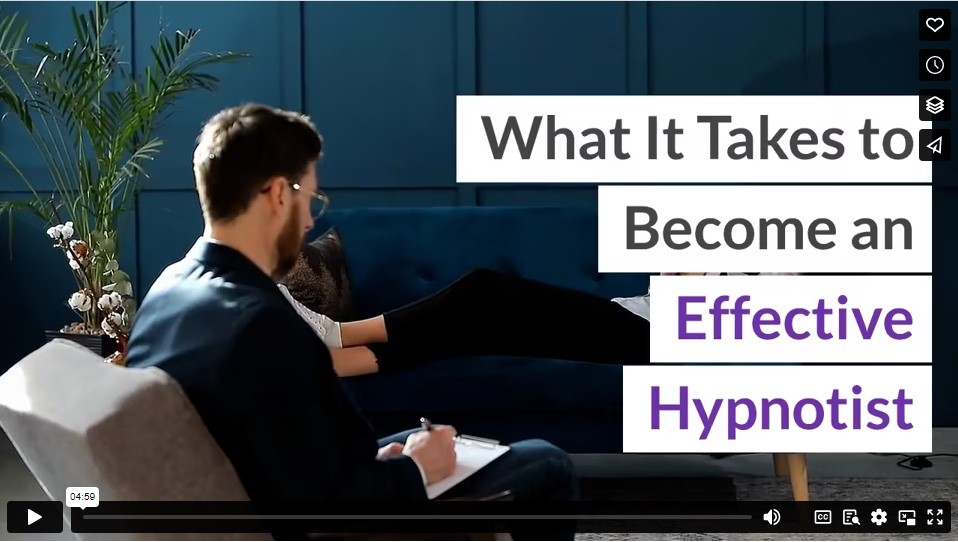If anything worth doing is worth doing well, it makes sense that you’d want to maximize your efficacy as a hypnotist. Not only will your business be more successful if your sessions are more effective, but you will also have the increased satisfaction of helping your clients work through their challenges more efficiently and thoroughly. Here are some of the elements it takes to excel as a hypnotist:
Hypnosis Skill
As Captain Obvious once said: to be an effective hypnotist, you must know how to hypnotize someone effectively. But how? First, you need to complete a professional hypnotherapy course. But that’s just the beginning. The better you are at your job, the better client outcomes you will see. In addition to keeping your skills sharp by regularly hypnotizing clients, ongoing professional hypnotherapy training courses will hone your abilities and teach you new ways to approach various client challenges.
Confidence
Confidence will make you both a better hypnotist and a more successful businessperson. Many first-time hypnosis clients will be nervous, skeptical, or even fearful of the process. They can easily interpret any hesitation on your part as a lack of faith in your ability to help them. If you don’t believe it, they won’t either.
Much of your confidence will come from your training and experiences during your process. As you grow in your practice, you will become even more confident. Remember that you model for your clients how optimistic they should feel about the power of hypnotherapy. Your belief in the process will be contagious. Always enter your sessions with confidence in your skills and strive to demonstrate that confidence to clients and potential clients.
Routines
Even if a child has heard the same bedtime story a hundred times, that’s often the one they ask for. That’s not because they don’t have a bookshelf full of other captivating stories. It’s because there is comfort in familiarity.
The same principle applies to hypnosis. For your clients, bearing their profound traumas, deepest fears, or most difficult challenges can be scary. Using the comfort of predictable routines can create a warm familiarity that relaxes your clients and helps prepare them for hypnosis.
Some ways to create routines are having familiar scents present, greeting them in the same way each time, or using the same inductions. These recognizable patterns can remove some of the anxiety around doing challenging self-work and help your clients succeed in their goals.
Rapport
You will ask your clients to deal with difficult, personal topics. They aren’t going to feel comfortable revealing those things to someone who feels cold or distant. That’s why it is critical that you establish a rapport with each client. Your ability to connect is a huge predictor of success with your hypnosis.
Take the time to get to know and understand your clients. Be fully present when they are speaking. Consider making it a habit to ask about some details of their life before you settle in and begin the hypnosis process. Demonstrating that you remember they got a new cat or that their spouse started a different job shows that you have a connection with them and aren’t simply working from a script. That can break down resistance, build trust, and leave your clients in the ideal state for successful hypnotic work.
Entrepreneurial Skills
Even the greatest hypnotist will fall flat if they can’t effectively run their business. Part of being an effective hypnotist means having clients to hypnotize. You must also evaluate opportunities, develop effective marketing strategies, price your services competitively but profitably, do basic accounting, and handle client communications.
These are all learnable skills. You may struggle with the business side of things. If so, working with a consultant or seeking advanced training on how to build a hypnotherapy business can help fill in any areas of weakness.
Effective Communication and Marketing
We aren’t talking about how you communicate during a session, though that’s important, too. To be an effective hypnotist, you need to be able to communicate effectively about your services with clients and potential clients.
Returning calls or emails promptly conveys professionalism and can be the difference between converting a potential client into a paying client or having them go elsewhere. Answer your calls with a professional-sounding greeting. Check your emails for mistakes and avoid overly casual language. These things matter when conveying your professionalism and gaining client trust.
Consider your website. Does it present a polished, professional image of you and your practice? Is it easy to navigate? Does it give necessary information without overwhelming the reader? Creating a pleasant, user-friendly website is worthwhile. It may be the initial impression that gains or loses you a client. Then ask these same questions about all your marketing materials. Your brochures and business cards are an extension of you and your practice. Don’t neglect them. Yes, your skill as a hypnotherapist is most critical to your practice. But you can’t prove your skill to a client who never books a session because your website was unengaging or your flier was amateurish.
Running a successful hypnotism business is a two-part process. First, you must be a great hypnotist, which means getting training, interacting confidently, establishing effective routines, and creating a rapport with clients. Then, you must also be an effective business person. That requires presenting yourself in a manner that generates confidence and provides a sense of professionalism. It also means handling or outsourcing the business aspects of your practice, including things like accounting, taxes, and billing. Address both sides of this equation, and your hypnosis practice can thrive.
Infographic
Enhancing your proficiency as a hypnotist is crucial for success in your business. It involves mastering communication skills, understanding psychological nuances, and refining techniques for inducing hypnotic states. This not only leads to financial gains but also enhances client satisfaction. By embracing these elements, your journey as a hypnotist can transform into a meaningful and impactful practice, transcending mere professional success.

Video




